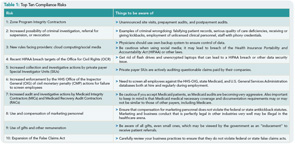
WASHINGTON, D.C.—To reduce the potential risk of submitting improper claims for payment or other violations of Medicare regulations and laws, rheumatologists and healthcare providers who participate in Medicare and other federal health benefits programs should develop, implement, and adhere to a personalized effective compliance plan, a legal expert said during a session titled, “Top 10 Compliance Risks Facing Physicians” here at the 2012 ACR/ARHP Annual Meeting, held November 9–14 in Washington, D.C. [Editor’s Note: This session was recorded and is available via ACR SessionSelect at www.rheumatology.org.]
According to Robert W. Liles, Esq.—an attorney at Liles Parker PLLC in Washington, D.C. who specializes in medical compliance issues—the Secretary for the Department of Health and Human Services (HHS) may require all participating providers to have a comprehensive compliance plan under the Patient Protection and Affordable Care Act. Although Liles said no mandatory date has been set for rheumatologists to comply with this requirement, he expects the date to be announced sooner rather than later.
“Rheumatologists are under the radar,” Liles told a roomful of specialists at the annual meeting. “Like oncologists, they often dispense extraordinarily costly drugs, such as the biologics infused to patients suffering from chronic disease,” he added. “In light of the multiple layers of private Medicare and Medicaid contractors currently engaged by the government to ferret out alleged overpayments and fraud, everyone in this room will likely be audited at some point in the future,” he emphasized.
To help educate rheumatologists on some of the compliance risks they currently face or may face in the near future, Liles discussed the top 10 risks to physicians in private practice (see Table 1, below) and 10 easy steps that physicians can implement to reduce their risk of noncompliance with the law (see “Ten Easy Steps to Improve Your Compliance,” p. 32).
Among these, Liles talked about a type of Medicare contractor that focuses almost entirely on nonhospital providers, including rheumatologists in private practice. Called Zone Program Integrity Contractors (ZPICs), they are “knowledgeable of the ‘ins and outs’ of Medicare’s most complex billing practices, and are adept at using sophisticated data mining techniques to identify and target physicians and other providers who appear to be outliers when compared to their peers,” Liles said.
Zone Program Integrity Contractors (ZPICs)
Mr. Liles said aggressive ZPIC enforcement actions—which are on the rise—may represent a far greater threat to the ongoing viability of a rheumatologist’s practice than a postpayment audit or a mere overpayment demand. ZPICs conduct unannounced site visits designed to identify coding and billing deficiencies, as well as business-related violations, Liles said. Increasingly, ZPICs have been placing providers on prepayment review, which requires the provider to submit all supporting documentation for assessment before a claim is paid. “Prepayment reviews can prove disastrous for physicians with a high Medicare patient population,” he said, adding that a prepayment review can remain in place for six months to a year and lead to serious cash flow problems while claims are being assessed by the ZPIC. “In some instances, being placed on prepayment review can lead to bankruptcy,” he added.
Another concern is the use of postpayment audits in which a ZPIC takes a representative sample of the provider’s claims and then extrapolates any overpayment identified to all claims. He said this could result in enormous alleged damages that must be appealed by the provider.
Final Thoughts
Liles emphasized the need to take claims, reviews, and audits from Medicare and private payers seriously. He also reiterated the importance of developing, implementing, and adhering to provisions in an effective compliance plan, one that is tailored to the needs and specific risks faced by one’s own organization. He recommended against using a “cookie cutter” compliance plan developed by others, or one that can be downloaded from the Internet. As Liles noted, “your compliance plan should be a reflection of your particular practice, and should serve as a road map for staying within the four corners of the law.”
Mary Beth Nierengarten is a freelance medical journalist based in St. Paul, Minn.
Ten Easy Steps to Improve Your Compliance
- Screen your employees. Have they been excluded from participation in the Medicare or Medicaid programs?
- Verify licenses, degrees, and certificates. Are they up to date? Is the individual’s license restricted in any way?
- Conduct a preliminary HIPAA audit. What steps must you take to reduce the possibility of a breach?
- Read your contracts. What are your obligations and your rights under each contract?
- Pull a list of claims billed in the last 90 days and examine the top three most frequent types of claims billed to see if your physicians are complying with applicable evaluation and management (E/M) requirements. Read and understand the 1995 and 1997 E/M guidelines published by the federal Health Care Financing Administration (HCFA).
- Review prior claim denials and determine why claims have been denied. Are the denials a one-time error, or do they represent a larger problem?
- Educate staff and ensure they are all qualified to do their jobs. Train, train, train!
- Adopt an honor code. Liles recommends a version of the honor code used by Texas A&M University. “Our practice and staff do not lie, cheat, steal, or tolerate those who do.”
- Set up an anonymous complaint line or e-mail address. Give patients and employees an opportunity to bring problems to your attention without the fear of retaliation.
- Develop and implement an effective compliance plan. Liles compared a compliance plan to a flu shot: you can still develop the flu after a flu shot, but hopefully vaccination reduces the severity. A compliance plan may not protect against all mistakes, but is likely to help reduce the seriousness of ones made.



